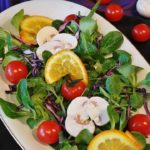Healthy Aging…at Any Age
Healthy aging. It almost sounds like an oxymoron, doesn’t it? Is this even possible? The simple answer is, YES!
There are numerous ways we can maintain good health as the years add up. I know this  will surprise you—they all involve lifestyle!
will surprise you—they all involve lifestyle!
First of all, the younger we are when we start doing these things, the better. So, no matter what age you are today, begin now and you’re right on schedule.
Note: When I refer to inflammation in the information below, I’m referring to chronic, unregulated inflammation that is found with autoimmune conditions, cancer, diabetes, heart disease, chronic pain, allergies. Well-regulated inflammation saves our lives! There are many ways we can keep inflammation (and disease) reduced. Some of them are listed.
A Few Tips for Healthy Aging:
*Exercise. This is about more than burning calories and working out so you can eat ice cream (yes, I have used this reasoning). Moving helps your immune system and autonomic nervous system (the system that controls functions you don’t have to consciously think about, like your heart beating and food digesting). Lots of things count. Choose activities you enjoy so you reap the most benefit. Choosing activities you hate are not beneficial for relieving the stress—plus, you won’t be committed.
*Play a musical instrument. I’ve heard numerous people in their later years express  the desire to learn how to play something. JUST DO IT! This is great, especially when you do it with other people, like in an orchestra or band. Doesn’t playing (fill in the instrument of your choice here) with a bunch of your friends sound like fun? Who knows where that could lead!
the desire to learn how to play something. JUST DO IT! This is great, especially when you do it with other people, like in an orchestra or band. Doesn’t playing (fill in the instrument of your choice here) with a bunch of your friends sound like fun? Who knows where that could lead!
*Get involved in your community and get socially connected. There are so many opportunities here and the social aspects are critical to longevity. Loneliness is associated with poor health, and greater sensitivity to pain. People who feel socially excluded and have negative emotions experience increased inflammation, which affects health adversely. Social stress and bullying have a more severe effect on immune functioning than other stressors.
*Volunteer. Volunteers have less inflammation, better quality of life, and less intensity of illness when it does strike. We need to care about others and feel cared about. Our lives must have meaning.
*Eat a diet that does not increase inflammation. This is a topic that is HUGE. I’ll  break it down and cover it more in future blogs. For now, here’s the short story: the typical Western diet tends to increase inflammation. The Mediterranean way of eating is one good option. There are others, however, this is probably the most well-known. Basically, it consists of eating mostly plant-based food (beans and legumes, vegetables, fruits, whole grains); eating fish and poultry at least twice a week; eating primarily olive oil; limited red meats and sugars. None of this is a surprise.
break it down and cover it more in future blogs. For now, here’s the short story: the typical Western diet tends to increase inflammation. The Mediterranean way of eating is one good option. There are others, however, this is probably the most well-known. Basically, it consists of eating mostly plant-based food (beans and legumes, vegetables, fruits, whole grains); eating fish and poultry at least twice a week; eating primarily olive oil; limited red meats and sugars. None of this is a surprise.
*Meditation. Meditation can help maintain cognitive function and reduce inflammation. Simply sitting quietly and focusing on your breathing counts as meditating. There are Loving Kindness meditations and many others. This is not some hocus pocus idea, in case some of you are raising your eyebrows and thinking “Yeah, right!” In a couple controlled studies of stressed caregivers and lonely adults, it was discovered that the expression of genes in immune cells can indeed be influenced by meditation.
Breathe.
Cheers to one new habit today~
“You are never too old to set another goal or to dream a new dream. “—C.S. Lewis
Reference: Goehler, Dr. Lisa E., “Mind-Body Interactions and the Stress-Inflammation Connection.”


